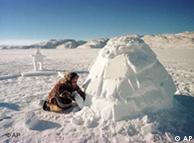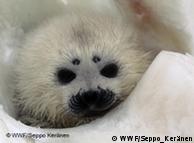European Union |24.09.2008
Greenland's Inuits blast EU Plans to Ban Seal Skin Products
Greenland's indigeneous Inuits fear that the European Union's latest proposal to ban imports of seal skins could repeat one of the most crippling economic episodes in recent memory.
Twenty years ago, the native Inuits saw one of their major sources of income hit by international boycotts on seal products.
"This is a war against us and we can't accept that," Aqqaluk Lynge, who heads up the Greenlandic branch of the Inuit Circumpolar Conference (ICC), told reporters.
Despite assurances that seal products certified to result from humane hunting techniques or from traditional hunting by Inuits across the Arctic region would be excluded from the proposed ban, the indigenous people of Greenland still have major concerns that their livelihoods will once again be at stake.
"Exemptions for Inuits have not worked before, and the ICC's position is that exemptions will not work this time around either," Lynge told an international Arctic conference in the western Greenlandic town of Ilulissat earlier this month.
While the proposed ban, put forward by the European Commission in July, is mainly aimed at Canada, where hunters this year were allowed to slaughter 275,000 seals, or nearly a third of the 900,000 seals hunted each year around the globe, the Inuits rely heavily on their own seal trade to survive.
Economy relies on seal products
 Bildunterschrift: Großansicht des Bildes mit der Bildunterschrift: Greenland's population is made up mostly of Inuits
Bildunterschrift: Großansicht des Bildes mit der Bildunterschrift: Greenland's population is made up mostly of Inuits
Greenland, an autonomous Danish territory of only 57,000 residents, including 50,000 Inuits, however also relies heavily on seal hunting, counting some 2,300 professional hunters and about 6,500 recreational hunters.
In 2006, the last year for which numbers are available, 113,000 seals were killed off the shores of the island, which unlike Denmark is not part of the EU.
Greenland's hunters are all Inuits who, according to their representatives, do not kill seal pups and only kill adult seals with a virtually painless shot to the head.
But while they in theory should not be affected by a potential EU ban, they fear they could soon see their markets shrivel as they did 20 years ago when boycotts aimed especially at halting inhumane hunting practices targeting baby seals nearly wiped out the entire industry.
Public opinion "does not distinguish between Canadian and Greenlandic hunters, something we noticed in the 1980s," the island's former Deputy Prime Minister Josef Motzfeldt lamented to reporters.

Comments